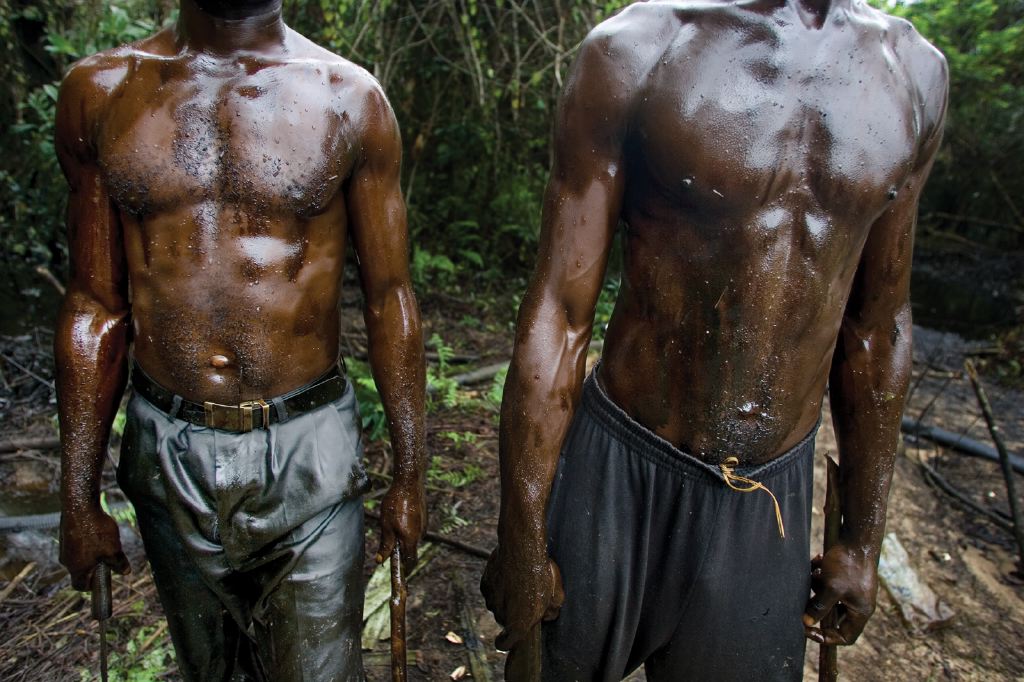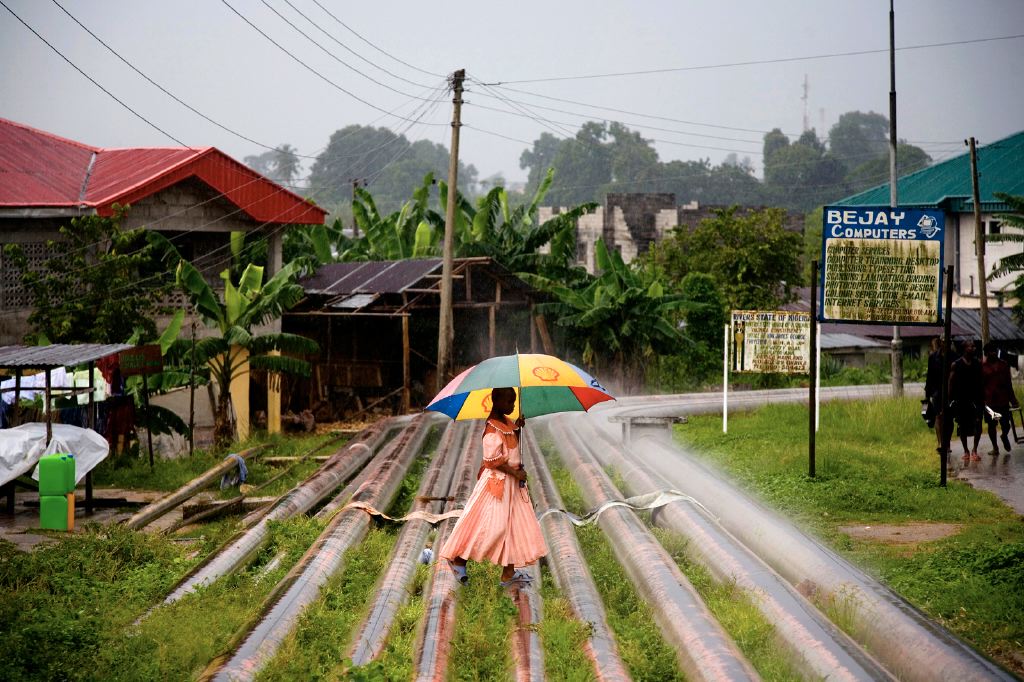I don’t like offshore drilling either. If you care about the effects of pollution, climate change, and a whole range of other issues, it’s counter-intuitive.
But I’m really torn, especially after having learned so much about the incredible damage our thirst for oil does to poor countries around the world. From Uganda and The Sudan to The Niger Delta and Ecuador, someone is already paying the price for our mobility and wealth enabled by cheap oil.
So, I don’t like drilling in my backyard, but until we find a way to reduce our thirst and need for oil so we don’t contribute to the destruction of other people’s backyards anymore I don’t feel good about refusing my share of the environmental costs.
Oil creates the illusion of a completely changed life, life without work, life for free…. The concept of oil expresses perfectly the eternal human dream of wealth achieved through lucky accident…. In this sense oil is a fairy tale and, like every fairy tale, a bit of a lie.
– Ryszard Kapuściński, Shah of Shahs
Consider this: According to the BP Statistical Review of World Energy Americans consumed 6.5 BILLION barrels (884 million metric tons) of oil in 2008, or 22.5% of world oil consumption. While China burned 2.75 billion barrels (375 million metric tons) and increased its share to 9.6% of total world oil consumption, Americans are still by far the biggest consumers of oil per capita. Over 45% of crude oil, more than 10 million barrels every day, is refined into light distillates, the gasoline which powers our cars. Another 29%, almost 7 million barrels a day, is refined into middle distillates like jet kerosene and diesel oils. In other words, 75% of the oil we burn and release into the atmosphere (almost 5 billion barrels a year!) is used to haul ourselves all over the place with our behinds firmly planted in a “sitting device.”
Well, so I agree, it’s outrageous that the administration wants to open offshore areas to oil drilling, but as long as we consume almost a quarter of the world’s oil, what are we going to tell these guys?
Scenes in Oloibiri Town, Niger Delta

An oil spill from an abandoned Shell Petroleum Development Company well in Oloibiri, Niger Delta. Wellhead 14 was closed in 1977 but has been leaking for years, and in June of 2004 it finally released an oil spill of over 20,000 barrels of crude. Workers subcontracted by Shell Oil Company clean it up.
photo & caption by Ed Kashi
For example, exporting 948 thousand barrels per day to the United States, Nigeria was the third largest supplier of U.S. crude oil in 2009, right behind Canada and Mexico, and ahead of Saudi Arabia. So every time we get in our cars or look at the plethora of neatly packaged products in the aisles of our supermarkets it’s good to remember this parallel view from Okrika.
Community Life in Okrika

Okrika is a troubled area near Port Harcourt that has oil, refineries, pipelines and violence. Factional fighting is common here. Fishing is struggling, like in most of the delta, but was once the main source of employment. Scenes of community life around the NNPC (Nigerian National Petroleum) pipelines that run directly through this community.
photo & caption by Ed Kashi
Aside from the high environmental costs of fueling an automobile — and rarely added into the equation — there is a whole catalog of waste and excess associated with modern driving habits. A study conducted by the respected German research institute Umwelt-und Prognose-Institut Heidelberg (also see Dirty from Cradle to Grave – John Whitelegg) provides a glimpse into the hidden costs (externalities) of ‘sitting in motion’:
The Environmental Cost of One Car
Extracting Raw Materials (steel, iron, rubber, plastics and aluminum):
26.5 tonnes of waste
922 cubic metres of polluted air
Transporting Raw Materials:
12 litres of crude oil in the ocean
425 million cubic metres of polluted airProducing the Car:
1.5 tonnes of waste
74 million cubic metres of polluted airDriving the Car:
18.4 kilos of abrasive waste
1,016 million cubic metres of polluted airDisposing of the Car:
(sulfuric acid for batteries; heavy metals and VOCs in paints; mercury in circuits; CFCs and other greenhouse gases used in foam seats and body parts; asbestos in brake pads)
102 million cubic metres of polluted airConclusion: A car causes more pollution before it’s ever driven than in its entire lifetime of driving.
Here’s what’s interesting: So much of our oil consumption is unnecessary and wasteful. For example, about 40% of all trips made in the United States are two miles or less. So how did we get to a point where fewer than 10% of all trips are made by walking and biking?
There are of course a lot of positive trends these days. For example, Secretary of Transportation Ray LaHood recently told a group of bike advocates that federal transportation planners are finished raising the almighty auto above cyclists and walkers. People and communities all over the country are making progress towards creating more walkable and bikeable communities. Organizations like Ecocity Builders, Walkscore, or Streetsblog have been working tirelessly to offer alternatives to our car-centered way of life.
 But we’re still nowhere near holding down our end of the “reduce oil consumption” bargain. The Alliance for Biking and Walking recently released the 2010 Benchmarking Report on bicycling and walking in the U.S. It found that while funding for bicycle and pedestrian infrastructure has slightly increased over the last two decades, most federal, state and local funding for transportation still goes toward making room for cars.
But we’re still nowhere near holding down our end of the “reduce oil consumption” bargain. The Alliance for Biking and Walking recently released the 2010 Benchmarking Report on bicycling and walking in the U.S. It found that while funding for bicycle and pedestrian infrastructure has slightly increased over the last two decades, most federal, state and local funding for transportation still goes toward making room for cars.
The bottom line is this: While 9.6% of all trips nationwide are people powered, a mere 1.2% of federal transportation funding is spent on bicycling and walking.
Old habits are hard to break. It’s really difficult to get out of our cars and reduce our dependence on oil (foreign or domestic) when an entire infrastructure has been built based around the automobile. As President Obama said a while ago, the U.S. is like a cruise liner, it takes time to make a turn. The fact is that most people in this country depend on their car for survival, and until we change that, we will need oil (and yes, even electric cars require oil, see box above). And until we make the big structural changes needed to break our addiction, I think it’s fair that we carry some of the burden and costs associated with our way of life.
My life is dedicated to making those changes, but as long as the people of Nigeria, Uganda and Ecuador and the ecosystem they depend on have to bear the brunt of our wasteful lifestyles and infrastructure, I can’t go protesting against domestic offshore drilling. What I will do though, is everything in my power to encourage our government to pass the kinds of legislation that keeps shifting our focus toward walkable cities, sustainable agriculture, clean energy and energy conservation. If we all work together on this, we will hopefully some day soon get to the point where we don’t have to decide whether to drill right here or over “there.”
As the 2010 Benchmarking Report concludes:
[youtube=http://www.youtube.com/watch?v=pfzMtfxdDlk]In these times of high gas prices, a warming climate, increasing traffic congestion, and expanding waistlines, increasing bicycling and walking are goals that are clearly in the public interest. As this report shows, where bicycling and walking levels are higher, obesity, high blood pressure, and diabetes levels are lower. Higher levels of bicycling and walking also coincide with increased bicycle and pedestrian safety and higher levels of physical activity. Increasing bicycling and walking can help solve many of the largest problems facing our nation. As this report indicates, many states and cities are making progress toward promoting safe access for bicyclists and pedestrians, but much more remains to be done.









Thanks for sharing this Sven, especially so clearly and succinctly! For people of faith I would encourage them to ponder ‘What would Jesus (peace be upon him) drive?’ (see e.g. http://whatwouldjesusdrive.info/ from the US evangelicals – transport as moral issue). And more acutely with Gulf of Mexico disater on what American imam Zaid Shakir says: “The real finger of blame should point at each of us [after stating re BP petroleum disaster that some blame BP, some Halliburton, some the Government etc]. We know the environmental, political, and social consequences of the oil-based civilisation we have allowed to evolve. Yet we have done little to stop it.” (http://www.emel.com/article?id=73&a_id=2025). My 2p. In peace, Rianne
Thanks so much for stopping by Rianne. I absolutely agree, it’s much easier to blame a big anonymous corporation than to examine our own lives. Of course we can’t let BP get off the hook for the oil spill, but it is just another reminder of the consequences of our wasteful ways of living and getting around. Without looking deeply at ourselves I don’t think it’s possible to make the big changes that are needed. Great links, I love the WWJD site, it always gives me hope when I see religious organizations who are willing to look at themselves critically and who work to be part of the solution. Sending many hugs to you!